|
|
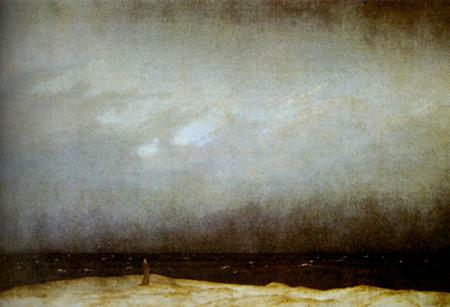
Capuchin Friar By The Sea
Caspar David Friedrich
_______________________
Caspar David Friedrich and the Interior Dictation of Landscape
Tom Clark
Vanitas
He avoided Goethe's invitations to come to Weimar and work together on a
collaboration
He was too busy collaborating with certain beings
inside him
whose commands he found so much more compelling
they came alive
during his solitary strolls into the countryside at dawn or just after moonrise
his favorite time
during which he often paused to sketch
a group of trees a cloud a boulder a row of dunes or a tuft of grass
at their urging
Every true work of art (he wrote) is conceived in a sacred hour
and born
from an inner impulse of the heart
(....)
When the mineral world dissolves into the cosmic flux
the animal and vegetable worlds will have been long gone
but the beings who existed inside Friedrich and dictated his landscapes
will still be carving vast silences out of elemental gulfs
...(more)
Vanitas Magazine
_______________________
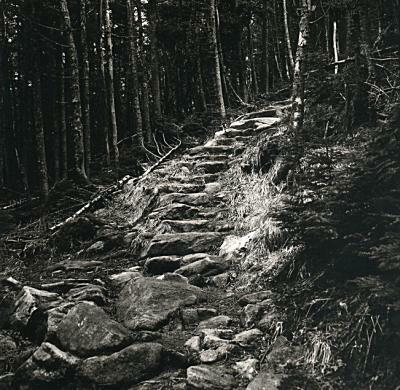
Staircases
Maria Levitsky
_______________________
The New Geography
A Roundtable
Jeffrey Kastner, Tom McCarthy, Nato Thompson, and Eyal Weizman
bookforum
The present epoch will perhaps be above all the epoch of space. We are in the epoch of simultaneity: we are in the epoch of juxtaposition, the epoch of the near and far, of the side-by-side, of the dispersed. We are at a moment, I believe, when our experience of the world is less that of a long life developing through time than that of a network that connects points and intersects with its own skein.
-
Michel Foucault, “Of Other Spaces,” 1967
The practice of geography is by its nature a ticklish, paradoxical enterprise. It is at once the study of objects and of subjects, of things and of behaviors, of the world around us as a phenomenon producing human activity and produced by it. A realization of the generative potential in such dichotomies—between the material and the symbolic, between places as conceived and places as experienced, between spatial and temporal models of existential understanding—has long influenced the academic discipline of geography. And in today’s world, where the familiar order of things seems increasingly contingent and fluid, destabilized by political and military turmoil, economic upheaval, and rapid technological development, a similar impulse among artists, writers, architects, and other cultural producers to interrogate and reimagine conventional notions of the physical and social landscape we inhabit grows only more vivid....(more)
_______________________
Searching for Larger Waters
Larry Sawyer
Searching for the larger waters
you become a plot without achievement
and this business of humid distillation,
its golden impulse, disturbs their sleep.
These decibel selves, a lifetime avalanche,
wear a pair of scissors instead of clouds.
In contrast to earth’s simplicity, evaporating poems,
breathe a tiny paradise of ambiguity
line the horizon with euphemisms, and
purple the blood with their affectionate clattering.
Fogged Clarity
via NewPages Blog
_______________________
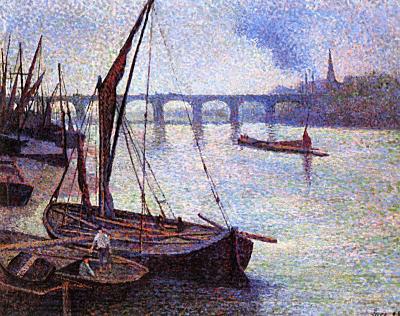
Vauxhall Bridge
Maximilien Luce
b. March 13, 1858
_______________________
from Tenderlies
Stephen Vincent
16.
Gorgeous one falls, a calypso lift, solid mist
An artichoke in lavender flower, the green leaf in whorl:
Whiskey liberates melancholy, the singular pine shingle
Numbered 6.9.1, stroke by stroke, eliminates representation:
Collage was winter, each canvas is a weather-spoon. Would I know you
In satin blue, Sarah Vaughn, go for the moon, strapless black shoulders
Octave unto octave, butterfly wing, triangular, geometric, solid blue
Black, the voice graveled, yet more true. What's tender will perch
Un-perch, one never falls in love, one does"
Light falls 24 hours a day on an alphabet.
...(more)
onedit 12
_______________________
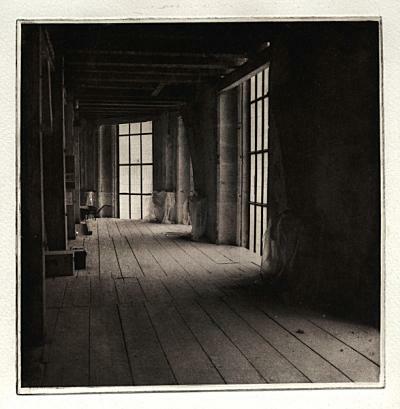
Prague Warehouse Maria Levitsky
Artist Statement
I see my photographs of the built environment as spaces for thinking. The architecture, freed of its physical aspect by the abstraction of the photograph, becomes a space of ideas. To look at them is to go into an architectural space of the mind. Because I photograph almost exclusively under available light conditions, the quality of light coming through the windows becomes a distinct factor in creating the formal and emotional tone of the image. Reflecting on this, the notion of the obscure chamber, or camera obscura comes to my mind. The camera is a ‘dark chamber’ into which light enters through a lens before hitting the film’s emulsion. Likewise, the dim rooms that I photograph have windows as apertures that let light in....(more)
_______________________
Aesthetic Separation, Aesthetic Community:
Scenes from the Aesthetic Regime of Art
Jacques Rancière
(....)This is the point where the as if of the community constructed by the aesthetic experience meets the as if at play in social emancipation. Social emancipation was an aesthetic matter because it meant the dismemberment of the body animated by that ‘belief’. In order to understand it, let us shift from the marble of the mutilated statue to the reality ‘in flesh’ of a dissociation between the work of the arms and the activity of a gaze. I borrow my example from a worker’s revolutionary newspaper called Le Tocsin des travailleurs (The Workers’ Tocsin) issued during the French Revolution of 1848. Among reports and statements on the situation, that issue contains an apparently apolitical description of the experience of a joiner who works as a floor-layer. This is how the joiner writes his diary in the third person:
Believing himself at home, he loves the arrangement of a room, so long as he has not finished laying the floor. If the window opens out onto a garden or commands a view of picturesque horizon, he stops his arms and glides in imagination toward the spacious view to enjoy it better than the possessors of the neighbouring residences.
This is what the aesthetic rupture produced: the appropriation of the place of work and exploitation as the place of a free gaze. It is not a matter of illusion. It is a matter of shaping for oneself a new body and a new sensorium. Being a worker meant a certain form of fitting between a sensory equipment and its destination. It meant a determined body, a determined coordination between the gaze and the arms. The divorce between the labouring arms and the floating gaze introduces the body of a worker into a new configuration of the sensible; it overthrows the ‘right’ relationship between what a body ‘can’ do and what it cannot. It is no coincidence that this apparently a-political description was published in a workers’ revolutionary newspaper: the possibility of a ‘voice of the workers’ went through the disqualification of a certain worker’s body. It went through the redistribution of the whole set of relationships between capacities and incapacities that define the ‘ethos’ of a social body. This is also why the same joiner recommends to his friends specific readings: not novels engaging in social issues, but the stories of those romantic characters – Werther, René or Oberman - who suffered from the misfortune that is forbidden by definition to the worker: the misfortune of having no occupation, of not being fit or equipped for any specific place in society. What literature does is not providing messages or representations that would give to the workers the awareness of their condition. It is triggering new passions, which means new forms of balance – or imbalance – between an occupation and the sensory equipment fitting it. That politics of literature is not the politics of the writers. Goethe, Chateaubriand or Senancour were certainly not willing to arouse such passions among the labourers. It is a politics inherent in literature as an art of writing which has broken the rules that made definite forms of feeling and expression fit definite characters or subject matters....(more)
Art&Research
_______________________
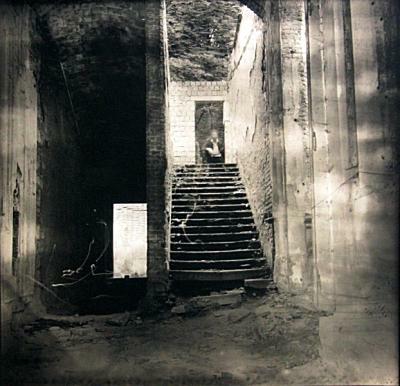
Ghost on Stairs
Maria Levitsky
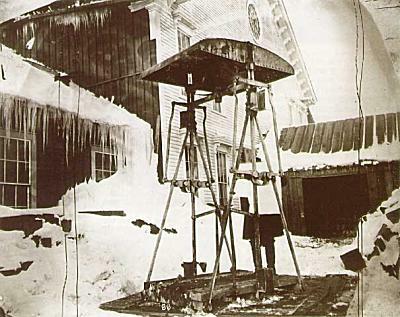
Savage-Cage
Virginia City
1867
Timothy O’Sullivan
1840 - 1882
182 Selected Images
George Eastman House
'Surrealistic and disturbing':
Timothy O’Sullivan as Seen by Ansel Adams in the 1930s
Britt Salvesen
Abstract
In 1937, Ansel Adams described the photographs taken some sixty years earlier by Timothy O’Sullivan in the American West as “surrealistic and disturbing.” He was writing to Beaumont Newhall, who was then curating a landmark exhibition celebrating the centenary of photography’s invention.
This paper examines the 1930s as a formative moment in the Modernist history of photography. At this time, Adams and Newhall—influenced also by Alfred Steiglitz and Edward Weston—developed a history for their young medium that emphasized certain practices and approaches. The Western Survey photographs of the 1870s became cornerstones in this history, for they seemed to exemplify a photographic sensibility unencumbered by artistic aspiration.
A tension develops here between the attempt to define and restrict the medium, and the need to explain the strange qualities of these early photographs, leading to the invocation of surrealism. By examining surrealism’s deployment in this context, the paper provides a different angle from which to view the West as subject and surrealism as style in the history of photography.
Journal of Surrealism and the Americas, Vol 2, No 2 (2008)free registration required
_______________________
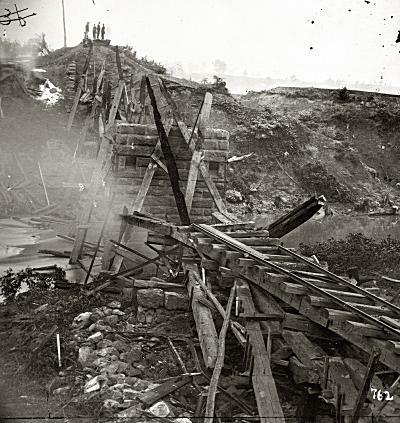 Timothy O'Sullivan
_______________________
Timothy O'Sullivan: Shadows of Subjectivity in the Photographer's Frame
Viewing the archive:
Timothy O'Sullivan's photographs for the Wheeler survey, 1871-74
Robin E. Kelsey
Art Bulletin Dec, 2003 _______________________
The Archive of the Future / The Future of the Archive
Invisible Culture | Issue 12
[T]he question of the archive is not, I repeat, a question of the past…but rather a question of the future, the very question of the future, question of a response, of a promise and of a responsibility for tomorrow. The archive: if we want to know what this will have meant, we will only know tomorrow. -
Jacques Derrida
In his study on the power and politics of the archive, Archive Fever, Jacques Derrida outlines the aporetic desire that defines the archive, describing it as an illness that strives to reconcile the will to safeguard significant documents in human history with the wish to share those documents with others. For many academics, researchers, and students, archives used to be and still are contentious ground, guarded tightly by the archivist/gatekeeper whose relationship with the material is very different than that of the researcher. The archivist aims to preserve and protect; the researcher hopes to explore and experience. Certainly, much archival research is marked by its prerequisite red tape: filling out forms, providing letters of introduction, divesting of all but the necessary belongings, and arming oneself with only a notepad and a #2 pencil. At many archives, this is still the procedure and one that is necessary to ensure the safety and longevity of the material housed. However, in recent years, technology has radically altered how we understand the archive and what it means to conduct archival research, as many physical archives are digitizing their holdings, paradoxically both broadening our ability to access archival sources and shifting the way in which archives mediate our relationship to the past. ...(more)
_______________________
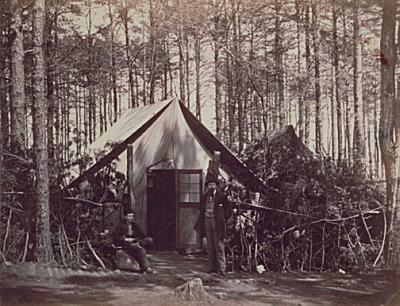
General Post-Office
Army of the Potomac
Brandy Station, Virginia
Timothy O'Sullivan
1863
_______________________
Writing on glass is like writing on water: regardless of what one tries to inscribe on these surfaces, such writing is always also a metaphor for the ephemeral nature of all things. True, a certain kind of mythifying fiction has sometimes tried to change this metaphor into its opposite, by imagining a message engraved on eternal glaciers, in the deep polar snow, protected on all sides by the uniform whiteness, a kind of immense graffiti—indeed, it would have to be a message of colossal proportions—and preferably in an incomprehensible and therefore immortal language, presenting a truth at once indispensable and indecipherable. And yet, from the moment one first masters the gestures of writing—and probably, for some people, up until their writing hand can move no more—there is a compulsion, a desire mixed with anguish, to write words and signs that can be erased almost immediately: in sand by a wave, in dust by footsteps, in pencil by an eraser; or else by water, rain, time, or tears smudging the ink. - Jacques Roubaud
An excerpt from Jacques Roubaud's forthcoming novel
brooklyn rail
The LoopJacques Roubaud Translated from the French by Jeff Fort Dalkey Archive Press
Seventeen years after the publication of the first volume of Jacques Roubaud's epic and moving The Great Fire of London, Dalkey Archive Press is proud to publish the first English translation of The Loop, the second novel in Roubaud's Proustian series, which has in its capacity to astonish been compared to the compositions of Messiaen and the buildings of Antonio Gaudi.
_______________________

Slaves
J. J. Smith's Plantation
South Carolina
Timothy O'Sullivan
1862
_______________________
A new possibility of life
The experience of powerlessness as a solution to the problem of the worst
Leonard Lawlor
eurozine
The religious and globalization complement one another, forming a mirror image of one another. Both the englobing of globalization and the return of the religious know no limits. In their efforts of marketing and conversion, in other words, in their efforts, of conquest, both globalization and the religious are forms of war; indeed they are forms of total war, and even worse they are forms of total war disguised as peace. Our "today" is defined by this formula: "war without war". The total or global nature of this disguised war leads to what I am calling the problem of the worst. The problem of the worst is the problem of our "today". In the simplest terms, the problem of the worst is apocalypse, total violence or total suicide. If our "today" is defined by a disguised total war, then the problem of the worst is so bad today that it requires that we make every effort to find a solution. It may already be too late. ...(more)
_______________________
How He Wrote His Songs
Lorrie Moore reviews
Hiding Man: A Biography of Donald Barthelme by Tracy Daugherty
In a way, Barthelme's work was all inner life, partially concealed, partially displayed. His stories are a registration of a certain kind of churning mind, cerebral fragments stitched together in the bricolage fashion of beatnik poetry. The muzzled cool, the giddy play, the tossed salad of high and low: everything from cartoon characters to opera gets referenced in a graffitti-like chain of sentences. Conventional narrative ideas of motivation and characterization generally are dispensed with. Language is seen as having its own random and self-generating vital life, a subject he takes on explicitly in the story "Sentence," which is one long never-ending sentence, full of self-interruptions and searching detours and not quite dead ends (like human DNA itself, with its inert, junk viruses), concluding with the words "a structure to be treasured for its weakness as opposed to the strength of stones."...(more)
.....................................................
Donald Barthelme's barthelmismo
jessamyn
_______________________
Crack Open the Shells
Hal Foster reviews Correspondence: The Foundation of the Situationist International (June 1957-60) by Guy Debord, translated by Stuart Kendall and John McHale
Inspired provocateurs during May 1968 in Paris, the Situationists are now the stuff of legend: one of those rare avant-gardes whose art and politics were not only radical but also forged together in radical fashion. Yet, as these early letters of the young Guy Debord, the leader of the group, make clear, they were the stuff of legend from the start....(more)
_______________________

The Gould and Curry Mill
Virginia City, Nevada
Timothy O'Sullivan
1867
_______________________
Melencolia Illa Heroica:
Françoise Proust, Walter Benjamin and `Catastrophe in Permanence’
Andrew Gibson
static
Abstract
This essay draws on Françoise Proust’s work on Walter Benjamin to argue the crucial importance of a radical heresy for our times: what the present culture thinks of as catastrophe has no major bearing on thought. Catastrophe is not a question of singular manifestations of destructiveness — acts of terror, natural disasters, epidemics — at least, insofar as these supposedly prove by contrast the persistence of a non-catastrophic rule. Catastrophe is everywhere and permanent. The exception has become the rule. Catastrophe remains, in permanence, because of historicity. This becomes fully apparent with the onset of modernity. Modernity massively accelerates the production of catastrophe. We confront modernity as a radical paradox in which the fatum prevails as such precisely because of the absence of all foundations. Modern progress ceaselessly confirms itself in place as an indefinite work of ruination, not least when it hopes to put paid to that work. Only truth resists catastrophe in permanence: truth, that is, the exception to the exception which lays bare a normative injustice. Truth is the province of the victim. But we can identify with truth via the melancholia that puts the future under a taboo, seeks to pay our debt to the sufferings of the past, and thus to instruct the continuous catastrophe. It is the past that lies before us. The essay closes with an account of Cristian Mungiu’s film Four Months, Three Weeks, Two Days (2007), as offering a compelling image of catastrophe in permanence.
Static Issue 07 - Catastrophe
Static
Architectural Association, Birkbeck College (University of London), the Institute of Contemporary Arts, Science Museum and Tate.
Aiming to initiate interdisciplinary intellectual debate about paradoxes of contemporary culture, Static presents contributions from an international team of academics, artists and cultural practitioners. The materials, assembled for each issue around a theme, include analytical essays and articles, interviews, art projects, photographic images, etc.
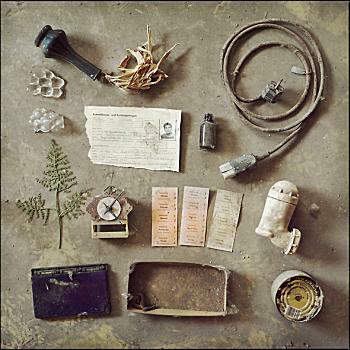
Archäologie der Arbeit
[Archeology of Work]
Fritz Fabert
via Jörg Colberg
_______________________
The Nights of Labor Revisited
Jacques Ranciere
Preface to the Hindi edition of The Nights of Labor: the workers' dream in 19th century France. Trans. Abhay Dube. English Trans. Rana Dasgupta
The Indian reader who opens this book in 2009 will no doubt think it is a strange thing. How can these stories of nineteenth-century French lockmakers, tailors, cobblers and typesetters be relevant to the information revolution, the reign of immaterial production or the global market? This question, it should be said, was already present for the French reader who opened this book twenty-seven years ago. We did not speak yet of globalization, nor of the end of the proletariat, of history or of utopia. Quite the contrary: France had recently elected a combined socialist and communist government, which proudly laid claim to the traditions of Marxism and of working class politics. And it is in this context that the book seemed to run counter to its own time, and became difficult to classify. The author was a professional philosopher who had struck his first blows, in the 1960s, by participating in the theoretical enterprise of Louis Althusser, who wished to rebuild Marxist theory. Now, instead of offering philosophical theses, he was telling stories about the French working class of the nineteenth century. And he offered nothing by way of Marxism – no analysis of the forms of industrial production, of capitalist exploitation, of social theories or of class struggles or worker movements. His workers, moreover, were not “real” workers; they were artisans from olden times, dreamers who dabbled in poetry and philosophy, who got together in the evening to found ephemeral newspapers, who became intoxicated by socialist and communist utopias but for the most part avoided doing anything about them. And the book seemed to lose itself in the aimless wanderings of these people, following the dreams of one, or the little stories others recounted in their diaries; the letters they wrote about their Sunday walks in the Paris suburbs, or the everyday concerns of those who had left for the United States to try out their dream of fraternal communalism. What on earth were readers to do with these stories in 1980?...(more)
The Politics of Aesthetics: The Distribution of the Sensible
Jacques Rancière Translated by Gabriel Rockhill google books
The Names of History: On the Poetics of Knowledge
Jacques Rancière
Translated by Hassan Melehy
google books
The flesh of words: the politics of writing
Jacques Rancière
Translated by Charlotte Mandell
google books
The Ignorant Schoolmaster
Five Lessons in Intellectual Emancipation
Jacques Rancière
translated by Kristin Ross
pdf download
Film fables: Jacques Rancière
Translated by Emiliano Battista
google books
The philosopher and his poor
Jacques Rancière
Translated by Andrew Parker et. al.
google books _______________________
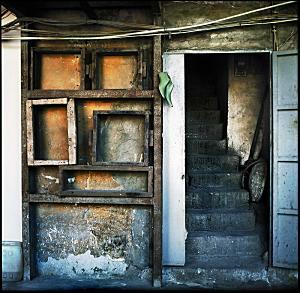
Fritz Fabert
_______________________
Jacques Rancière and Indisciplinarity
Translated by Gregory Elliott
I try to problematise the categories that structure diagnoses of our present and debates about it. Thus, I’ve attempted to rethink democracy by refusing both its official identification with the state forms and lifestyles of rich societies and denunciation of it as a form that masks the realities of domination. Official apologists and Marxist critics basically concur in characterising democracy as a mode of government built on a society defined as a society of consumers. In opposition to this dominant view I’ve reactivated the real scandal of democracy – which is that it reveals the ultimate absence of legitimacy of any government. As the foundation of politics it asserts the equal capacity of anyone and everyone to be either governor or governed. I’ve thus been led to conceive democracy as the deployment of forms of action that activate anyone’s equality with anyone else, and not as a form of state or a kind of society.
As regards aesthetics, I’ve questioned the schemas of modernity and post-modernity shared by supporters of modernism, eulogists of the post-modern or high priests of the sublime. All of them more or less agree in characterising the modern artistic revolution in terms of an autonomisation, conceived as a break with representation and as each art concentrating on the exigencies and possibilities of its own material: the transition to abstract painting, atonal music, ‘intransitive’ poetry whose heroes are Malevitch, Schönberg or Mallarmé. On this basis, they conceive the transition from the modern to the contemporary as a break with such a vocation, as a melange of the arts, a mingling of art and popular and advertising imagery, a confusion of art and life. They can either welcome this or deplore it, justify the confusion or demand an art of the sublime and the unrepresentable. But in each instance they validate the schema. For my part, I’ve tried to show that what is called artistic modernity has, from the outset, been shot through with a tension between two contradictory requirements: one of these makes art and aesthetic perception into a specific sphere of experience, disconnected from the rules that operate in other spheres; the other feeds on interchange between the arts and spheres of experience and converts art’s ways of making into collective ways of life. In constructing the archaeology of this tension, I wanted to escape indulgent or doom-laden verdicts on the present state of art; to make it possible to perceive continual shifts in the topography of possibilities, as opposed to major breaks and grand schemas of progress or decline....(more)
_______________________
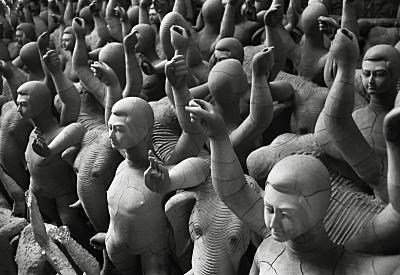
Fritz Fabert
_______________________
Do the languages of the adult retain anything of the infinitely varied babble from which they emerged? If they did, then it would be only an echo, since where there are languages, the infant's prattle has long ago vanished, at least in the form it once had in the mouth of the child who could not yet speak. It would be only an echo, of another speech and of something other than speech: an echolalia, which guarded the memory of the indistinct and immemorial babble that, in being lost, allowed all languages to be.(....)
Do the sounds that the child uses in onomatopoeias represent the last remnants of an otherwise-forgotten babble or the first signs of a language still to come? The exclamations of the child, in any case, indicate, that language evolves in a time that is neither unitary nor lineal; they suggest that however resolutely one speech may develop, it continues to bear within it elements — traces or announcements —of another.
- Daniel Heller-Roazen, Echolalias: On the Forgetting of Language pdf download here
_______________________
Contagiontology
Christopher Kullenberg, Karl Palmås
eurozine
Panopticism is waning; panspectrocism is the nascent social diagram that organizes our lives. Heineken and Wal-Mart use pattern recognition and computer-assisted predictions of future behaviours to secure their markets. Google, the panspectric corporation par excellence, tells us that the company wants to know what you'll want to do tomorrow. This brings renewed poignancy to Gabriel Tarde's contagion-centric thought...
_______________________

Christoph Morlinghaus
interview via Junk for Code
_______________________
A Thread of Knots: Jacques Derrida’s Homage to Emmanuel Levinas’ Ethical Reminder
Miriam Bankovsky
The metaphor of the knotted thread is not a mere metaphor in Derrida’s homage to the work of Emmanuel Levinas. His own essay, “At this very moment in this work here I am,” is itself structured as a thread of textual knots. In this paper, I will ask three questions of this work in order to understand how Derrida’s work works to theorize “the loop,” the circle that loses its way, and why looping is, for Derrida, an ethical practice. First of all, what is Derrida’s aim, in threading this work of knots, or, in other words, what is the intended end of his work? How does Derrida work to achieve this aim, or, in other words, how does he tie his knots? Finally, to what extent is Derrida’s intended and final end achieved in this work of knots, or, in other words, why is it that Derrida’s work succeeds only inasmuch as he fails to fulfill his intention of paying homage?...(more)
Invisible Culture Issue 8: The Loop as a Temporal Form
_______________________
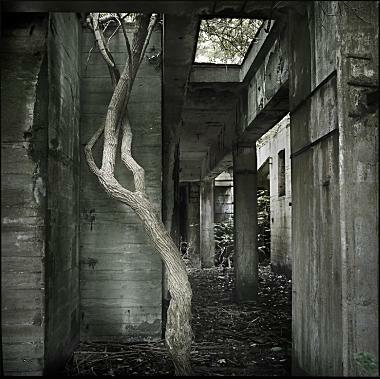 oxygen factory
Fritz Fabert
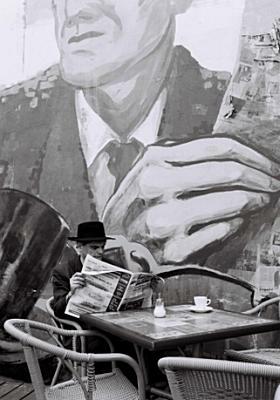
The Day of Important News
[Prague]
Stanko Abadžic 1 2 3
_______________________
David Bromige: A Selection
by Meredith Quartermain
Ours is a century of manic specifiers who mistrust anything, so it's as though we knew one another already.
Typicality Enthralls with its Particular Failures
David Bromige
... when money becomes the universal un-conscious (= ideology), we become, as always when what’s unconscious is in control, inefficient as a species, firing whistle-blowers to perpetuate error nobody much cares about before the banks begin to fail. Then all hell breaks loose. The cliches smash through the backdrop, clanking. One minute, Ordinary people were reading Sayonara in the ben-jo. The next, The Way of Zen had led its lotophagoi to call the cops out. Clinamen’s queer for exogamy, but right then a concluding ensemble, which serves as an epilogue, is frequently omitted.(....)
The oppressive mis-use of the term unique, and let’s include all valorization of the individual, with its particular voice, perpetua-tion of anachronistic hierarchies, cultivation of foible, stems from a prior suspicion, too feared to be acknowledged, that, by the terms of our society, namely, monetary worth, all are, however inequitably disposed along its curve, interchangeable units, defined as capable of causing amounts of currency to adhere to themselves. Sexual activity has become one of the chief mask-ing routines ideologically calculated to buy off any such awareness. Concurrently, an alternative system continues to operate, threatening even as it is threatened by the first one spoken of here, whose units measure their abilities by different sets of criteria. But any one of us belongs to both systems. Is the pro-noun I a healing declaration of self or the last refuge of a scoun-drel? Write when you find out, or work....(more)
Golden Handcuffs Review
_______________________
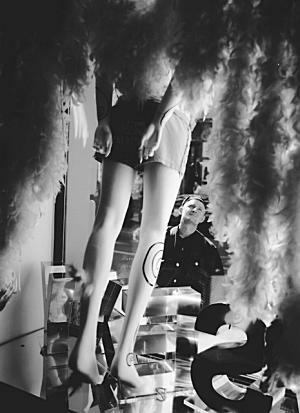
Stanko Abadžic
_______________________
Being Gazed Upon
G.L. Mind
archipelago
There are many kinds of looks, but a gaze is peculiar. It is a steady look. It is not a dirty look, though it may be “dirty” in some sense. (The man’s gaze made me feel dirty, among other complex sensations, but it was hardly a dirty look.) A gaze is never wild, though it may be mad. A gaze may not actually last long, but it is never a blink, neither hasty nor abrupt. It cannot be confused with a glance or a glimpse. There may be a battle of gazes. The gazer may “avert his gaze” under pressure or threat. I was afraid, and had no way to explore this option in Chicago. A gaze’s steadiness reflects thoughtfulness. It indicates a mind at work (somewhere, unknown and remote) thinking, drawing inferences, contemplating. It is the opposite of a stare. A stare shows dispassion, even an implacable lack of emotional connection. It is the look of an animal contemplating prey, or that of an android. (Tracking and identification data scroll down a head’s-up screen covering its field of vision.) A stare, heartless, without empathy, is the way you might expect a psychopath to consider you before making his kill. Men seem to understand the weight of intimidation that a stare can convey: in many sports, such as boxing, the initial stare-down is a ritual of domination. Even in make-believe, a stare displays an aggressive contempt and indifference: pitiful bug, I am going to destroy you. However brief, a gaze indicates thoughtfulness. The gazer seems to contemplate the person he gazes upon and even to invite connection....(more)
_______________________
The Head of a Woman
Ingibjörg Haraldsdóttir
Translation: Eiríkur Örn Norðdahl
The Head of a Woman
The head of a man is heavy
- Sigfús Daðason
The head of a woman is not heavy
The head of a woman is a
snowwhite
downy
wisp
The head of a woman sails
over bright-blue sunday-skies
and laughs
The head of a woman?
Bathed in tears
sweat
blood
Rushing
through a dark night
With no
hope of
resurrection?
Flying through the night
the head of a woman lost its bearings
and its way - but the sun
carried on regardless
accustomed to the wiggling laughters of
tulips
and moths
While the head of a woman
is not heavy
it’s nevertheless often
hard to hold
not to mention
the face
...(more)
_______________________

.....................................................
A figure that disturbs me, since I have met her too, but during the day, diurnal and spectral. Messenger of Melancholy, so similar to the apparition evoked by Henry James in The Turn of the Screw, motionless like a woman conscious of her guilt, slighjtly turned away so that we can escape from the memory of our own guilt.
from the introductiory chapter (available PDF)
A Voice from Elsewhere
Maurice Blanchot
translated by Charlotte Mandellsuny press
When I was living in Èze, in the little room (made bigger by two views, one opening onto Corsica, the other out past Cape Ferrat) where I most often stayed, there was (there still is), hanging on the wall, the likeness of the girl they called "The Unknown Girl from the Seine," an adolescent with closed eyes, but alive with such a fine, blissful (but veiled) smile, that one might have thought she had drowned in an instant of extreme happiness.(...)
It would be better to abancdon prudent reason and destroy the daytime wisdom that seeks to destroy "the wonderfull apparition / Welcomed as one trembles at the sight of a face seized by death." "She is there to watch over us / Who go to sleep only to see her."
Thus the dream and the rational day pursue an unceasing battle.
"Ä dream, but is there anything more real than a dream"? And how can one survive without dreaming "That the child, drawn to her familiar places / Comes into the garden of roses, and every night / Returns to fill the bedroom with her candid flame / That she holds out to us like an offering and a prayer"!
Influence and authenticity of l'Inconnue de la Seine
Anja Zeidler The Gaddis Annotations
In the The Savage God. A Study of Suicide Al Alvarez writes: "I am told that a whole generation of German girls modelled their looks on her," to add in a note: "I owe this information to Hans Hesse of the University of Sussex. He suggested that the Inconnue became the erotic ideal of the period, as Bardot was for the 1950s. He thinks that German actresses like Elisabeth Bergner modeled themselves on her. She was finally displaced as a paradigm by Greta Garbo."
_______________________

Après le Déluge
Susan Bee
.....................................................
Susan Bee: Eye of the Storm
Craig Olson
brooklyn rail
Bee's work projects out of the absurdity and openness of the surrealist ether like a root dipped in blood. Consecrated in a motley crew of archetypes, animals, cutout pulp novel women, myths, and holy winged demons, her recent work offers us a glimpse into the ageless disasters that have become all too real for us again, the metaphoric readings we apply to them, and the futility of ever trying to harness control over their power.
A.I.R. Gallery: February 4 – March 1, 2009
Susan Bee at the Electronic Poetry Center
M/E/A/N/I/N/G:
an anthology of artists' writings, theory, and criticism
By Susan Bee, Mira Schor
google books
_______________________
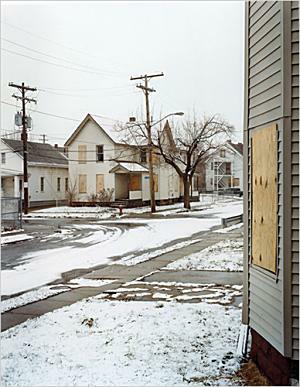
Foreclosureville
Reuben Cox
All Boarded Up
Alex Kotlowitz
The number of empty houses is so staggeringly high that no one has an accurate count. The city (Cleveland) estimates that 10,000 houses, or 1 in 13, are vacant. The county treasurer says it’s more likely 15,000. Most of the vacant houses are owned by lenders who foreclosed on the properties and by the wholesalers who are now sweeping in to pick up houses in bulk, as if they were trading in baseball cards.
_______________________
Ten Things You Can Do to Stay in Your Home
Advice and resources for preventing or fighting foreclosure.
The Nation
a special issue on reinventing capitalism, reimagining socialism.
_______________________
America Loses 23,000 Jobs Every Day
_______________________
Lying and history
Cathy Caruth
eurozine
I would like to address the problem of violence in the political realm by focusing on a question that, I believe, emerges out of several late works by the twentieth-century political thinker Hannah Arendt: What is history in the time of what Arendt calls "the modern lie"? In "Truth and Politics" (1967) and "Lying in Politics (1971), Arendt reflects on what she considers a profound philosophical conundrum at the heart of politics and the political: an intimate and foundational relation between politics and the lie that, I would suggest, has momentous implications for the way we think about political history (and more widely, I would argue, about history as such). Beginning from a reflection on the nature of political action in the context of lying, Arendt ultimately, I will argue, enables a rethinking of the very nature of history around the possibility of its political denial. What does it mean, she asks, for political history to be fundamentally linked, at certain points in modern times, to its erasure or lack of witness? And how might it be possible to witness from within this history?...(more)
_______________________
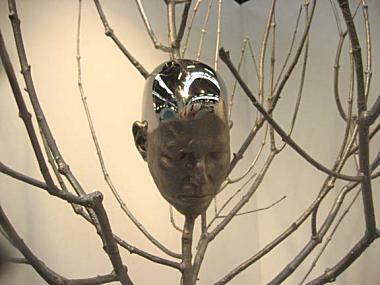
Rona Pondick
1 2
Armory Art Show NY
Charles Bernstein
Rona Pondick: orchestrated obsessions
Janet Koplos
Art in America , Sept, 2002
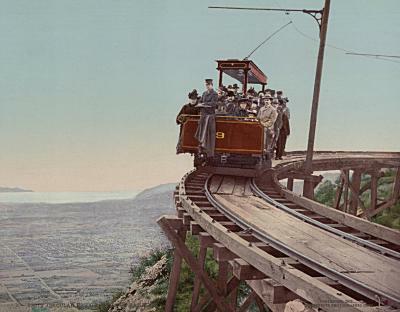
Circular Bridge
Mt. Lowe Railway
ca. 1897-1924
Detroit Photographic Company’s Views Of North America
ca. 1897-1924
Beinecke Rare Book and Manuscript Library
_______________________
Foucault and the Invisible Economy
Ute Tellmann
Abstract
This paper discusses the extent to which governmentality provides a critical visibility of the economy beyond its liberal imaginary. It argues that Foucault’s conceptual and historical understanding of liberal governmentality has two traits that encumber a de-centering of the economy from a Foucauldian perspective. The first obstacle results from a persistent asymmetry of the concept of governmentality as it remains solely geared towards replacing the monolithic account of the state. Governmentality is therefore in danger of rendering the economic invisible instead of advancing an analytics of power appropriate to the specificity of this field. The second impediment relates to how Foucault reads the invisibility of the economy asserted in liberal discourse. While Foucault emphasizes how the “invisible hand” imparts a critical limitation towards the sovereign hubris of total sight, the paper unearths a more complex politics of truth tied to the invisible economy. Drawing on selected historical material, the papers shows that the liberal invisibility of the economy rather functions as a prohibitive barrier towards developing novel and critical visibilities of the economy. A Foucauldian perspective on economy, the paper concludes, benefits from piercing through this double invisibility of the economy.
Foucault Studies Number 6, February 2009: Neoliberal Governmentality _______________________
Friends Within The Darkness
I can remember starving in a
small room in a strange city
shades pulled down, listening to
classical music
I was young I was so young it hurt like a knife
inside
because there was no alternative except to hide as long
as possible--
not in self-pity but with dismay at my limited chance:
trying to connect.
the old composers -- Mozart, Bach, Beethoven,
Brahms were the only ones who spoke to me and
they were dead.
finally, starved and beaten, I had to go into
the streets to be interviewed for low-paying and
monotonous
jobs
by strange men behind desks
men without eyes men without faces
who would take away my hours
break them
piss on them.
now I work for the editors the readers the
critics
but still hang around and drink with
Mozart, Bach, Brahms and the
Bee
some buddies
some men
sometimes all we need to be able to continue alone
are the dead
rattling the walls
that close us in.

Charles Bukowski
(August 16, 1920 – March 9, 1994) _______________________
The waxwing slain
Seamus Sweeney
It's a platitude that one's own voice sounds odd, sounds faintly ridiculous, when heard recorded. My own voice always sounded gloopy and bland to me, but this canon of Waxwings did not sound like my voice. It sounded robotic and musical at once, which was why it took me some time to recognise it as my own. Or, indeed, to recognise the words as my own (as they ostensibly were), although we'll come to that later. Before I can tell you about my life as a literary success, I must tell you about my life as a literary failure....(more)
Lots of fresh material up at nthposition
_______________________
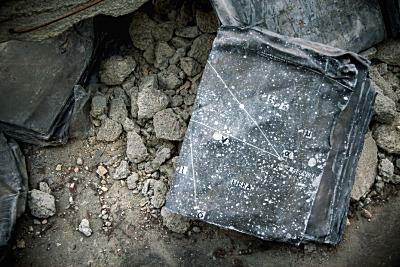 Anselm Kiefer
b. March 8, 1945 photo found here
“Break of the containers”
German and Jewish mythology with Anselm Kiefer
Atalante
L'Archive du Mal
Kiefer at Waggish
_______________________
Obama's timid liberalism
Michael Lind
salon
Once upon a time in the United States, public goods -- from retirement security and energy research to public roads -- were provided by the government and paid for by taxes. As late as the Nixon administration, the provision of public goods by government was considered perfectly compatible with a robust market economy by so-called Modern Republicans like Eisenhower and Nixon as well as New Deal Democrats like Roosevelt, Truman, Kennedy and Johnson. In the intervening 40 years, however, free-market fundamentalists of the Chicago School have managed to change the debate, redefining "socialism" to mean not only public ownership of the means of production, but also public provision of public goods.(....)
You might have thought that the Crash of 2008 would have led Democrats to reconsider this neoliberal approach to providing public goods by private means. But to judge from President Obama's budget, the White House is still living back in the neoliberal era, when the diminutive Milton Friedman cast a giant shadow....(more)
_______________________

American Steel and Wire Company's Plant
Cleveland
c1901
Detroit Photographic Company
_______________________
Social Collapse Best Practices
Dmitry Orlov
In organizations, especially large organizations, “best practices” also offer a good way to avoid painful episodes of watching colleagues trying to “think outside the box” whenever they are confronted with a new problem. If your colleagues were any good at thinking outside the box, they probably wouldn’t feel so compelled to spend their whole working lives sitting in a box keeping an office chair warm. If they were any good at thinking outside the box, they would have by now thought of a way to escape from that box. So perhaps what would make them feel happy and productive again is if someone came along and gave them a different box inside of which to think – a box better suited to the post-collapse environment....(more)
via Ethel the Blog
_______________________

The Lobby, Old Faithful Inn
Yellowstone Park
ca. 1897-1924
Detroit Photographic Company
_______________________
Obama's Next Gauntlet: Reviving the Middle Class
Robert Borosage
"It ain't easy. No use jokin'. Everything's broken." -
Bob Dylan
We can't go back to the old economy. That economy - marked by booms and busts, Gilded Age inequality, declining wages, growing household debts, and unsustainable trade deficits - didn't work very well for most Americans. President Obama is faced with the difficult task of creating the structure for the new economy even as he works to lift us out of the collapse of the old.
That's why his stunning budget calls for health care reform, ending our addiction to oil and investing in education as both a way out of the mess and a down payment on the future. His pace is as unrelenting as the crisis. Next up: reviving America's middle class, insuring that once growth returns, its blessings are widely shared. And the centerpiece of that is the (EFCA). (....)
... EFCA (Employee Free Choice Act) isn't just about worker rights. It's about whether we can return to an economy with a broad middle class. When unions represented 30% of the private economy, they won family wages, health care, pensions, paid vacations - the basics of middle class existence. Rising union wages and benefits helped lift the wages of non-union workers as well. America has never done much redistribution through taxes. We built a middle class because workers were able to win a decent share of the profits and productivity that they helped to generate. Unions were central to that.
Naturally, as the unions have lost ground, so has America's middle class. Over the eight years of the Bush recovery, we witnessed the extreme: an economy in which profits were up, CEO salaries soared, productivity was up, but workers lost ground. As a recent EPI statement notes, the median working household lost $2000 in annual income over that period. That reality contributed directly to the inequality, speculation, and household indebtedness that provided the kindling for the economic conflagration we now experience.
That's why Obama was an early sponsor of EFCA as a Senator. Earlier this month, he noted that he saw unions as part of the solution, not part of the problem. ...(more)
_______________________

The Cliff House, San Francisco
c1901
Detroit Photographic Company

Marisa Portolese
Portolese in CCCA’s Canadian Art Database
via We Can't Paint
_______________________
Dark Pines Under Water
Gwendolyn MacEwen
1941 - 1987
This land like a mirror turns you inward
And you become a forest in furtive lake;
The dark pines of your mind reach downward,
You dream in the green of your time,
Your memory is a row of sinking pines.
Explorer, you tell yourself this is not what you came for
Although it is good here, and green;
You had meant to move with a kind of largeness,
You had planned a heavy grace, an anguished dream.
But the dark pines of your mind dip deeper
And you are sinking, sinking, sleeper
In an elementary world;
There is something down there and you want it told. From The Shadow-Maker
Macmillan, Toronto - 1972
_______________________
from Dreams and Stones
Magdalena Tulli
Translated from the Polish by Bill Johnston
words without borders
The cities that ripen on the tree of the world are enclosed in shape like apples. Each is the same: Every one is different. An embodiment of a singular possibility from the register of the possible is the very name written above the railroad platforms. One river—a second is unnecessary—fixes its course definitively once and for all. One list of streets, one zoological garden. The inhabitants know by heart the colors of the clouds and of the plaster. Whatever comes to be can no longer be any different. When one thing is given to them another must be taken away. Every glance of theirs is accompanied by an awareness of loss. Crossing the city, they keep feverishly imagining what could yet be. If for instance the river flows broad and sluggish, passing shoals of sand, sooner or later they will create the other river, which was not given to them, deep and rapid, with steep banks overgrown with weeds. And so when the city germinates, when it ripens and when it rots, it contains within itself all possibilities at once, and the entire plan of the world. It is part and whole, infinitude and a godforsaken backwater, a particle in the world and at the same time an abyss into which the world vanishes—tiny as a fly in the ointment. For the rule that governs larger and smaller wholes declares that the small is contained in the large and the large in the small. And it is only thanks to this that the world fit into itself. And it is only in this way that it can endure. Because otherwise it would have nowhere to go....(more)
_______________________
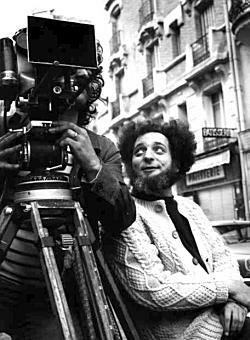
Georges Perec
7 March 1936 – 3 March 1982
photo — Claude Schwartz
L'Association Georges Perec
Reading Georges Perec
Warren Motte
Georges Perec: A Life in Words : a Biography
David Bellos
google books
Georges Perec, Oulibiographer
Bernard Magné
Translated by Daniel Levin Becker
drunken boat
Georges Perec: Traces of His Passage
Paul Schwartz
google books .....................................................
Writing Under Constraint
special issue and thread at the Electronic BookReview
Nothing Less and Nothing More
Alain Vuillemin reviews the Oulipo Compendium edited by Harry Mathews & Alastaire Brotchie
_______________________
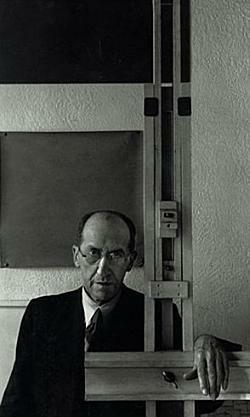
Piet Mondrian
March 7, 1872 – February 1, 1944
photo - Arnold Newman
_______________________
Imperialist Devastation of Peoples and the Evils Done in our Names
Manuel Valenzuela
Jan. 2006
... we should come out of our luxurious bubble that has shielded us from the evils inflicted on billions of humans that have not been as privy to a life of safety and security. Let us traverse the road of reality, sojourning through history and through mirages of hidden truths. Let us dive into the making of the Evil Empire so that we may see what our government has and continues to do in our name. The road ahead will not be easy to swallow or comprehend, yet we must open our minds to the possibility that what has happened is real and what is occurring is not fiction. Only then will we understand why our hands are smeared in the blood of tens of millions of human cadavers and countless more whose lives and futures have been devastated at the hands of the United States of America. Only by knowing who and what we are can we correct ourselves.(...)
The impenetrable bubble we live in protects us from empathizing with billions whose lives have been made worse since the birth of the Evil Empire. We have been made ignorant to that which has been unleashed onto the world and that owes its existence to our continued lifestyle and complicity by acquiescence and failure to act. The Evil Empire runs rampant through the planet, devouring all in its path, enslaving millions and conquering and despoiling lands.
Meanwhile, inside the belly of the beast we sit, basking in extravagance and splendor, complacent in life and circumstance, unwilling to open our eyes and minds to the evils done in our name....(more)
_______________________
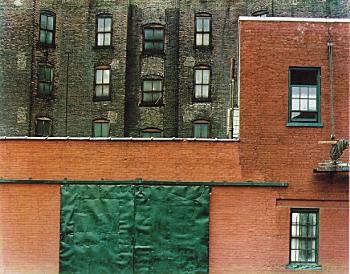
Red Brick Wall
New York, 1948
Arnold Newman
_______________________
Continuing Job Losses May Signal Broad Economic Shift
Peter S. Goodman and Jack Healy
Since the recession began, the economy has eliminated roughly 4.4 million jobs, and more than half of those positions — some 2.6 million — disappeared in the last four months.
The acceleration has convinced some economists that, far from an ordinary downturn after which jobs will return, the contraction under way reflects a fundamental restructuring of the American economy. In crucial industries — particularly manufacturing, financial services and retail — many companies have opted to abandon whole areas of business.
_______________________
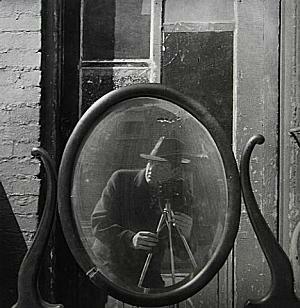
Self Portrait
1939
Arnold Newman
1918 — 2006
1 2 3
_______________________
Social Production, the Good Life, and the Ways of Desire
Timothy Burke
Easily Distracted
Desire can’t just be penned up into an interior reserve: it sometimes must leap out into the material world, to hold and to act. The prophets of thrift throughout the 20th Century were also always preachers on behalf of the intense disciplining of human subjectivity, to the management of time and the control of sensation and the rationalization of beauty, to a Taylorism of the soul. That we’ve given those thrifty, controlled disciplinarians up for their opposite numbers, a crazed frenzy of Dionysian racketeers who pretended to rationality while they engorged themselves, is a good sign that it’s time to rethink how and when we desire, to recognize the ways that social production enabled by innovative technologies have enriched us far more than SUVs or 4-bathroom suburban mansions. But it’s not a reason to stop wanting....(more)
 arch dam
Jones Falls Locks
photo - mw
_______________________
Deleuze And The Open-Ended Becoming Of The World
Manuel DeLanda
... the work of philosopher Gilles Deleuze makes it clear that a belief in the autonomous existence of the world does not have to based on essentialist or rationalist views. It will be the task of this essay to make a case for what we may call Deleuze's "neo-realist" approach, an approach involving a theory of the genesis of form that does away with essences, as well as a theory of epistemology that does not rely on a view of truth as a faithful reflection of a static world of beings.(....)
... unlike social constructivism, which achieves openness by making the world depend on human interpretation, Deleuze achieves it by making the world into a creative, complexifying and problematizing cauldron of becoming. Because of their anthropocentrism, constructivist philosophies remain prisoners of what Foucault called "the episteme of man", while Deleuze plunges ahead into a post-humanist future, in which the world has been enriched by a multiplicity of non-human agencies, of which metallic catalysts, and their acts of recognition and intervention, are only one example. And, in contrast with other realist or materialist philosophies of the past (such as Engel's dialectics of nature), the key non-human agency in Deleuzian philosophy has nothing to do with the negative, with oppositions or contradictions, but with pure, productive, positive difference. It is ultimately this positive difference, and its affirmation in thought, that insures the openness of the world....(more)
_______________________
Bruno Schulz
Sergei Kruglov
Tr. Vitaly Chernetsky
The sun outside the window, a redhead lilith
Laughing, devoured the names of the three angels.
But I’m but a child, and I won’t get scared,
Father! I’ll draw her,
An incantation: pencil, paper.
On a metallic branch outside the window sits that Stymphalian bird
The spring of 1942
Filled with melancholy yearning, begging for flesh
You know, father, if God really is
A rabbi from Drohobycz — then we are done for!
But if He is just G-d,
With the bleeding meaty emptiness of “o” (as if
They tore out, clinging tightly with crooked fingers
Eight pages right from the very middle
Of the dense, piquant, quivering moist-rose-like
Book) — then
It’s all right, perhaps we’ll somehow come back to life.
...(more)
Sergei Kruglov translated by J. Kates
New Russian Poetry
jacket
_______________________

Machu Picchu
Edward Ranney
Cultural LandscapeIdea Photographic: After Modernism
Museum of New Mexico
_______________________
Crisis In The Heartland
Consequences of the New Wall Street System
Peter Gowan
New Left Review 55, January-February 2009
An understanding of the credit crunch requires us to transcend the commonsense idea that changes in the so-called real economy drive outcomes in a supposed financial superstructure. Making this ‘epistemological break’ is not easy. One reason why so few economists saw a crisis coming, or failed to grasp its scale even after it had hit, was that their models had assumed both that financial systems ‘work’, in the sense of efficiently aiding the operations of the real economy, and that financial trends themselves are of secondary significance. Thus the assumption that the massive bubble in oil prices between the autumn of 2007 and the summer of 2008 was caused by supply-and-demand factors, rather than by financial operators who, reeling from the onset of the crisis, blew the price from $70 a barrel to over $140 in less than a year, before letting the bubble burst last June; a cycle with hugely negative ‘real economy’ effects. Similar explanations were tendered for soaring commodity prices over the same period; yet these were largely caused by institutional investors, money-market and pension funds, fleeing from lending to the Wall Street banks, who poured hundreds of billions of dollars into commodities indices, while hedge funds with their backs against the wall pumped up bubbles in coffee and cocoa.
Breaking with the orthodoxy that it was ‘real economy’ actors that caused the crisis carries a political price ...(more)
_______________________
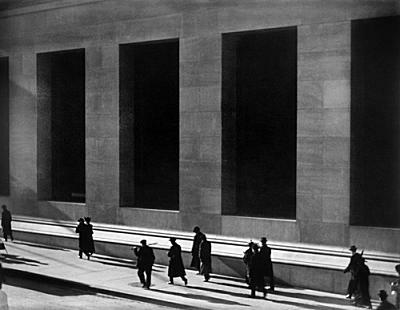 Wall Street
1915
Paul Strand
_______________________
Corruption-US: How Wall Street Paid For Its Own Funeral
Marina Litvinsky
The 231-page report, "Sold Out: How Wall Street and Washington Betrayed America," shows that the financial sector invested more than 5 billion dollars on purchasing political influence in Washington over the past decade, with as many as 3,000 lobbyists winning deregulation and other policy decisions that led directly to the current financial collapse....(more)
_______________________
Jacques Derrida’s ghost : a conjuration
David Appelbaum
pdf here
To learn to live: a strange watchword. Who would learn? From whom? To teach to live, but to whom? Will we ever know? Will we ever know how to live and first of all what “to learn to live” means? And why “finally”?
. . . A magisterial locution, all the same—or for that very reason. For from the lips of a master this watchword would always say some- thing about violence. It vibrates like an arrow in the course of an irre- versible and asymmetrical address . . .
But to learn to live, to learn it from oneself and by oneself, all alone, to teach oneself to live (“I would like to learn to live finally”), is that not impossible for a living being? Is it not what logic itself forbids? To live, by definition, is not something one learns. Not from oneself, it is not learned from life, taught by life. Only from the other and by death. In any case from the other at the edge of life. At the internal border or the external border, it is a heterodidactics between life and death.
-
Jacques Derrida, Specters of Marx
SOME MAPS DON’T fold neatly. This book is a case in point in that no sharp crease separates its scholarly concerns from those of ‘life.’ The presump- tion is that good philosophy serves a magisterial purpose, that its work lies with transmission, that it has access to a secret knowledge. The position is beyond the claim that philosophy teaches logical coherence and consistency in accord with its commitment to reason. To the contrary, a magisterial vo- cation must be knowingly assumed, not merely ascribed. There is an impor- tant corollary, namely, that the reader is an other, tout autre. Philosophy is cast into the role of a voice addressed to an other who, beyond the pale, would remain irrevocably silent were it not for philosophical discourse. In this regard, Jacques Derrida concurs with his dear friend Emmanuel Levinas, who writes, “What we are now exposing is addressed to those who shall wish to read it.” Not every reading voice can meet such a rigorous stan- dard. Some other force, in the form of an exigency, must be brought to align text, author, and reader before transmission. The task of alignment and the response it entails constitutes a subtext of my study.
_______________________
 dam road
Jones Falls
photo - mw
_______________________
"At bottom, we may say, the collector lives a piece of dream life. For in the dream, too, the rhythm of perception and experience is altered in such a way that everything - even the seemingly most neutral - comes to strike us; everything concerns us. In order to understand the arcades from the ground up, we sink them into the deepest stratum of the dream; we speak of them as though they had struck us."
- Walter Benjamin (The Arcades Project, "Convolute H" 206)
Citation as Explanation:
Walter Benjamin and Louis Zukofsky, Colporteurs Graham Lyons jacket
What both Benjamin and Zukofsky identify — one through the lens of an imperfectly enacted intentionality, one through a critique of self-serving criticism — is the problem of reading complexity, of explaining away difficulty.(....)
To be explanatory for a moment, the questions pursued in the present text grow out of my particular theoretical interests, which have always angled towards the question of subjectivity and power in texts. Who is the writer? How is he or she constructing his or her written self? What sort of power is he or she taking on or giving up? Who authorizes the author? And, ultimately, who or what gives meaning to text? Leading from Zukofsky and Benjamin, the admittedly manifold possibilities that grow out of these questions call for a rethinking of criticism as a vocation better suited to showing rather than to telling — to referentiality rather than to clarification.
Indeed, the role of outside texts — and I use the term “outside” advisedly, here — and the role of “outside” subjectivities attached to those texts has been a central question in twentieth century poetics. From Ezra Pound’s rewritings of Provençal verse and the poetry of Li Po to T.S. Eliot’s more or less convincing invocation of Jessie Weston’s Grail legend From Ritual to Romance in his explanatory notes for The Waste Land (n. 4, 2371), modernist poets continuously tread a line between reading a text, writing a text, and performing a critical act somewhere between the two — always with a mind to what might function as muse, and what might function as authorizer (and even guarantor of canonicity)....(more)
_______________________
theoretically apraxic
Thomas Lynch
Introductions
Thomas Lynch
‘In this alethosphere the prosthetically enhanced, plugged-in subject does not to flee reality in order to indulge his pleasure principle, for he is now able to remould reality in accordance with it. In other words, in the ultra-modern, advanced capitalist world, the pleasure principle and the reality principle are no longer in competition, but have merged to form a kind of corporation. The image Freud paints is of a friendly takeover of reality by the pleasure principle, which presents the former with a set of blueprints for the global cyber-city of its dreams. But Lacan stresses the underside of this merger. As the twentieth century wore on, and the utopian view of science gave way to dystopian visions, while capitalism grew more muscular, it became more difficult to hold on to the idea that pleasure had the power to programme reality. The reality (of the market) principle was clearly calling the shots, telling the pleasure principle in what to invest and what pleasures out to be sacrificed to get the best returns on those investments.’
-
Joan Copjec, ‘May ‘68, The Emotional Month’ in Lacan: The Silent Partners
I suppose it’s natural when starting a blog to provide some kind of introduction. This blog is my attempt to organize my thoughts as I work on the connection(s) between theology, psychoanalysis, and politics. Mostly I’ll focus on things that I’ve been reading, but I’m also interested in aesthetic reflections on these themes. I’m especially interested in photographic interpretations of subjectivity and psychoanalytic critiques of architecture and urban planning.
via Anthony Paul Smith at An und für sich _______________________
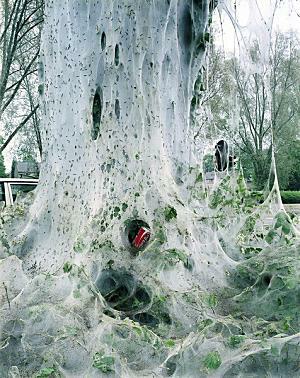
Hans Wijninga
 subtraction
Sebastian Lemm
_______________________
Art Fair! - Michael Mazzeo Gallery
March 4 - April 11
Featured artists include Juliana Beasley, Alison Carey, F&D Cartier, Caleb Charland, John Chervinsky, Rachael Dunville, Lucas Foglia, Jefferson Hayman, Yong Hee Kim, Sebastian Lemm, Chris McCaw, Leah Oates, Cara Phillips, Josh Quigley, Christopher Rauschenberg, Robin Schwartz, Will Steacy, Lacey Terrell, and Terry Towery.
_______________________
Video Archive: Diane Arbus
AMERICANSUBURB X
"This half-hour documentary was made that same year. It explores her work and ideas, often in her own words as spoken by a close friend. It includes reflections by some of the people who knew her best; daughter Doon, teacher Lisette Model, colleague Marvin Israel, and John Szarkowski, at that time the director of the photography department at the Museum of Modern Art."
_______________________
Words Without Borders
March 2009: Greece, Inside (and) Out
Kaspar Hauser in a Desolate Land
Dimitris Chatzis
Translated from the Greek by Peter Constantine
words without borders
There's a whole Greek world in Stuttgart, some forty thousand of us, more, in other words, than the whole town of Volos back home. And there are a lot of Greeks among us who've brought their villages with them: they sleep in them at night, and wake up in them every morning expecting to hear roosters crowing that never crow here. Here these villagers walk on concrete sidewalks and have no rocks to trip over—instead they trip over the construction lumber and cables. I'm not going to tell you about them, that's not my job, go look for them, they can tell you more about the Greek world here. What I'll tell you about is me.
And I'll tell you that I've been away from Greece for four years now, but never once, not once, have I felt that longing for my country. I don't even know what that kind of homesickness would feel like. The way I see it, my country is not a fatherland to me in the way Spain is to those silly Spanish girls, or Greece to my fellow Greeks who are wracked by longing, the way my pal Skouroyiannis longs for that village of his, Dobrinovo. I'm never back in Sourpi, never at the bus stop where Anastasia stood waiting for me, never at the main square in Almiros where our Sunday movie theater used to be, or at the lumberyard, or down at the canteen in Volos where the boss used to take us. I don't see myself there. I don't want to go back.
I am, I guess, a man without a country....(more)
From Paris-AthensVassilis Alexakis
Translated from the French by Alyson Waters words without borders
Traveling like this from one country to another, from one language to another, from one self to another, I thought I'd found a certain balance. I tried to translate myself once from Greek into French and once from French into Greek. I had fewer problems than I had anticipated. I don't know what the degree of relationship between the two languages is. It seemed to me, though, that I had found in each of them the words that suited me, a territory that resembled me, a sort of very personal little country. Someone told me about a foreign writer who wound up marrying his French translator. "Well," I thought, "I'm my own wife!" I was fairly happy for a while. I didn't have the impression I was betraying myself by using two languages, nor did I think I was betraying them....(more)
_______________________
Zombie Banks Are Devouring Our Public Money with No End in Sight
Bill Moyers
_______________________
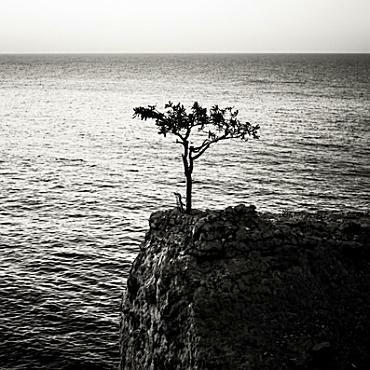
last tree
socotra
Josef Hoflehner
_______________________
Lost in Translation
James Merrill
March 3, 1926 - February 6, 1995
(....)
Kef easing Boredom, and iced syrups, thirst,
In guessed-at glooms old wives who know the worst
Outsweat that virile fiction of the New:
"Insh'Allah, he will tire—" "—or kill her first!"
(Hardly a proper subject for the Home,
Work of—dear Richard, I shall let you comb
Archives and learned journals for his name—
A minor lion attending on Gérôme.)
While, thick as Thebes whose presently complete
Gates close behind them, Houri and Afreet
Both claim the Page. He wonders whom to serve,
And what his duties are, and where his feet,
And if we'll find, as some before us did,
That piece of Distance deep in which lies hid
Your tiny apex sugary with sun,
Eternal Triangle, Great Pyramid!
Then Sky alone is left, a hundred blue
Fragments in revolution, with no clue
To where a Niche will open. Quite a task,
Putting together Heaven, yet we do.
It's done. Here under the table all along
Were those missing feet. It's done.(....)
Know already in that tongue of his
What Pains, what monolithic Truths
Shadow stanza to stanza's symmetrical
Rhyme-rutted pavement. Know that ground plan left
Sublime and barren, where the warm Romance
Stone by stone faded, cooled; the fluted nouns
Made taller, lonelier than life
By leaf-carved capitals in the afterglow.
The owlet umlaut peeps and hoots
Above the open vowel. And after rain
A deep reverberation fills with stars.
Lost, is it, buried? One more missing piece?
But nothing's lost. Or else: all is translation
And every bit of us is lost in it
(Or found—I wander through the ruin of S
Now and then, wondering at the peacefulness)
And in that loss a self-effacing tree,
Color of context, imperceptibly
Rustling with its angel, turns the waste
To shade and fiber, milk and memory.
_______________________
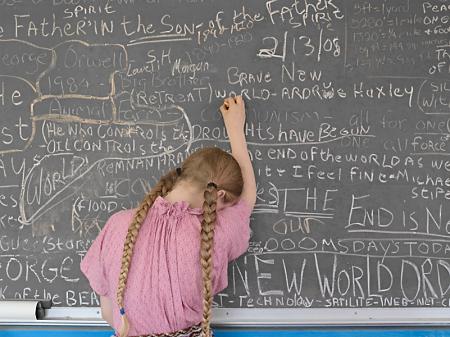 home schooling
Re-Wilding
Lucas Foglia
_______________________
from
Connoisseur of Chaos
Wallace Stevens
III
After all the pretty contrast of life and death
Proves that these opposite things partake of one,
At least that was the theory, when bishops' books
Resolved the world. We cannot go back to that.
The squirming facts exceed the squamous mind,
If one may say so . And yet relation appears,
A small relation expanding like the shade
Of a cloud on sand, a shape on the side of a hill.
IV
A. Well, an old order is a violent one.
This proves nothing. Just one more truth, one more
Element in the immense disorder of truths.
B. It is April as I write. The wind
Is blowing after days of constant rain.
All this, of course, will come to summer soon.
But suppose the disorder of truths should ever come
To an order, most Plantagenet, most fixed. . . .
A great disorder is an order. Now, A
And B are not like statuary, posed
For a vista in the Louvre. They are things chalked
On the sidewalk so that the pensive man may see.
V
The pensive man . . . He sees the eagle float
For which the intricate Alps are a single nest.

Flying Lessons
Cathy Spence
Little Heroes
Photographs of Children from the Permanent Collection
The Southwestern & Mexican Photography Collection
Texas State University-San Marcos
_______________________
Dancing with the Dead:
Language, Poetry, and the Art of Translation
Red Pine
CipherJournal
Every time I translate a book of poems, I learn a new way of dancing. The people with whom I dance, though, are the dead, not the recently departed, but people who have been dead a long time. A thousand years or so seems about right. And the music has to be Chinese. It’s the only music I’ve learned to dance to.
I’m not sure what led me to this conclusion, that translation is like dancing. Buddhist meditation. Language theory. Cognitive psychology. Drugs. Sex. Rock and Roll. My ruminations on the subject go back more than twenty-five years to when I was first living in Taiwan. One day I was browsing through the pirated editions at Caves Bookstore in Taipei, and I picked up a copy of Alan Ginsberg’s Howl. It was like trying to make sense of hieroglyphics. I put it back down and looked for something else. Then a friend loaned me a video of Ginsberg reading Howl. What a difference. In Ginsberg’s voice, I heard the energy and rhythm, the sound and the silence, the vision, the poetry. The same thing happened when I read some of Gary Snyder’s poems then heard him read. The words on a page, I concluded, are not the poem. They are the recipe, not the meal, steps drawn on a dance floor, not the dance....(more)
CipherJournal
...publishing creative works of art & literature that call attention to the process of translation. We will also include reviews of translated literature—both new and old—with a special emphasis on the merits of the translation.
The details of this new look towards translation remain to be discovered, both by our authors and our readers.
_______________________
from Odes: 36
by Basil Bunting
See! Their verses are laid
as mosaic gold to gold
gold to lapis lazuli
white marble to porphyry
stone shouldering stone, the dice
polished alike, there is
no cement seen and no gap
between stones as the frieze strides
to the impending apse:
the rays of many glories
forced to its focus forming
a glory neither of stone
nor metal, neither of words
nor verses, but of the light
shining upon no substance;
a glory not made
for which all else was made.
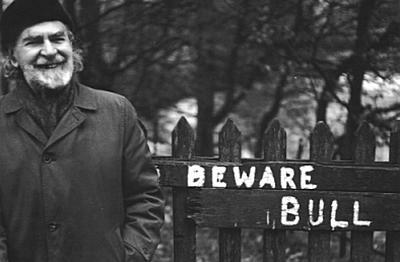
Basil Bunting
3 March 1900 – 17 April 1985
Photograph Copyright Jonathan Williams 1994
Complete Poems
Basil Bunting
google books
Introduction to Basil Bunting's Complete Poems
Richard Caddel
Jacket 10
The Basil Bunting Poetry Centre
Basil Buntingat at the Poetry Foundation
The Star You Steer by: Basil Bunting and British Modernism
James McGonigal, Richard Price
google books _______________________

Guillaume Apollinaire
Asger Jorn
3 March 1914 - 1 May 1973 93 images
_______________________
When Will You Come?
Spurious
Why does Levinas refuse to speak in the manner of Buber of God in the second person, as a you-ity? Why does illeity remain in the third person? In speaking, in witnessing, the 'il' of illeity is a word for the impersonality of the relation to the Other. It thus expresses the enigma of this relation insofar as it holds God apart from me, from my finitude, even as it interrupts that finitude (the-other-in-the-same that is Levinas's notion of the subject). Illeity, in its impersonality appears in the particular personality of the Other.
But this bestows the possibility of another reading, where the impersonality of illeity is understood as a name for a feature of speech. In order to explore this fully, I would have to take a long detour, showing how Blanchot is suspicious of a certain Platonic tendency in Levinas's account of speech, elevating speech above writing, before following an important recent reading of Totality and Infinity that places emphasis fraternity as a model for understanding the relation to the Other. I would have to show how it is in terms of the relation to the child that one might understand the structure of what Levinas later calls the-other-in-the-same.
Here, it will suffice to say that for Blanchot, the 'il' of 'illeity' can be understood to refer to another sense of the-other-in-the-same, and another kind of witnessing, and that the relation to the Other must be understood in terms of speech, and not the way the Other attends speech, accompanying and validating it as ethical by its silence presence. ...(more)
_______________________
Terror of the Ethical: On Levinas's Il y a
Michael Marder
pmc
Let us imagine, along with Levinas, that the all too obvious opposition of being and nothingness is not our only destiny, and let us suppose, moreover, that there is "something" otherwise than being, which is not, strictly speaking, nothing. In line with the Levinas orthodoxy, the otherwise-than-being will prima facie refer to the transcendent relation to the other, the ethical excess, and the final liberation of an existent from her tie to essence, the Spinozan conatus essendi. Nonetheless, nothing is less seamless or less secure than the transition from being to the ethical relation beyond being. An unavoidable risk associated with such an adventure without return to the same is that the otherwise-than-being is not a homogeneous field, since it entails both the ethical approach to the Other and a de-personalized, absolutely impersonal rustling of the there is (Il y a), which remains after the dissolution of hypostatized existence, of everything that is in being. Henceforth, it will be impossible to maintain a neat separation between these two senses of the otherwise-than-being that is other even to itself, in keeping with the Levinasian figure of alterity that is wholly other both in its form and in its content. While the ethical relation is anticipated in the anonymity of the there is, the trace of which it always retains, this residue itself poses a persistent threat to this relation ready to revert, at any moment, into the other avatar of what "is" beyond being. I call this double possibility terror of the ethical....(more)
_______________________

The Timid Proud One
Asger Jorn
_______________________
from Odes: 10. Chorus of Furies
by Basil Bunting
Guarda mi disse, le feroce Erine
Let us come upon him first as if in a dream,
anonymous triple presence,
memory made substance and tally of heart’s rot:
then in the waking Now be demonstrable, seem
sole aspect of being’s essence,
coffin to the living touch, self’s Iscariot.
Then he will loath the year’s recurrent long caress
without hope of divorce,
envying idiocy’s apathy or the stress
of definite remorse.
He will lapse into a halflife lest the taut force
of the mind’s eagerness
recall those fiends or new apparitions endorse
his excessive distress.
He will shrink, his manhood leave him, slough selfaware
the last skin of the flayed: despair.
He will nurse his terror carefully, uncertain
even of death’s solace,
impotent to outpace
dispersion of the soul, disruption of the brain.
_______________________
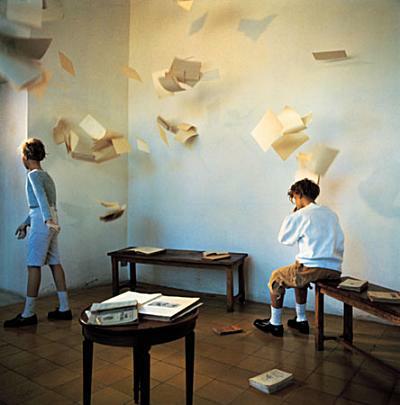
Flying Sheets of a Paper
Bernard Faucon
1 2 3
Elemental Children - The Photography of Bernard Faucon
Paul Sutton
the utopian
_______________________
Via delle Ombre
Louise Glück
Threepenny Review
On most days, the sun wakes me.
Even on dark days, there's a lot of light in the mornings—
thin lines where the blinds don't come together.
It's morning—I open my eyes.
And every morning I see again how dirty this place is, how grim.
So I'm never late for work—this isn't a place to spend time in,
watching the dirt pile up as the sun brightens.
During the day at work, I forget about it.
I think about work: getting colored beads into plastic vials.
When I get home at dusk, the room is shadowy—
the shadow of the bureau covers the bare floor.
It's telling me whoever lives here is doomed.
When I'm in moods like that,
I go to a bar, watch sports on television.
Sometimes I talk to the owner.
He says moods don't mean anything—
the shadows mean night is coming, not that daylight will never return.
He tells me to move the bureau; I'll get different shadows, maybe
a different diagnosis.
...(more) via The Page
_______________________
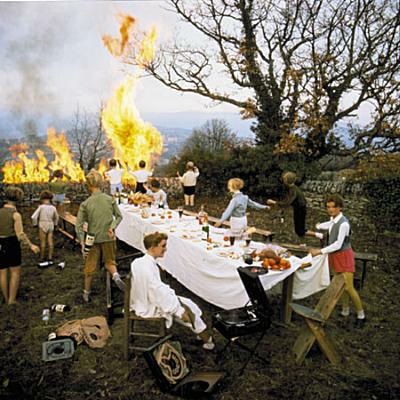 Holiday
Bernard Faucon
_______________________
Lovecraftian School Board Member Wants Madness Added To Curriculum
"Fools!" said West, his clenched fist striking the lectern before him. "We must prepare today's youth for a world whose terrors are etched upon ancient clay tablets recounting the fever-dreams of the other gods—not fill their heads with such trivia as math and English. Our graduates need to know about those who lie beneath the earth, waiting until the stars align so they can return to their rightful place as our masters and wage war against the Elder Things and the shoggoths!"(....)"Our schools are orderly, sanitary places where students dwell in blissful ignorance of the chaos that awaits," West said. "Should our facilities be repaired? No, they must be razed to the ground and rebuilt in the image of the Cyclopean dwellings of the Elder Gods, the very geometry of which will drive them to be possessed by visions of the realms beyond."...(more)
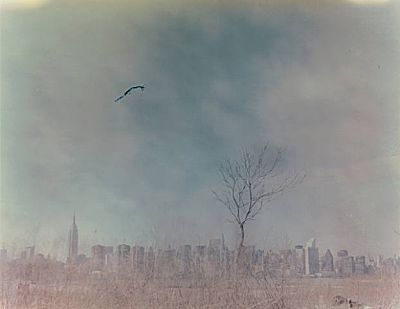
Trying to Dance
JH Engström
.....................................................
JH Engström: Looking For Presence
Martin Jaeggi
A profound sense of displacement and uncertainty pervades JH Engström's work. On the back cover of his 2004 book Trying to Dance he states, almost programmatically: "I am always looking for presence. Whenever I try, mydoubts get unmasked ... " Whereas most photographers use their camera merely as a tool to convey their deeply held convictions about the ways of the world to their viewers, Engström uses the camera and darkroom to pursue his doubts about whether it is possible to represent any real understanding of our surroundings. The urgent intensity of his work is predicated upon a radical questioning of the possibility of a meaningful communication with the world, an almost Heideggerian sense of "being thrown into world."...(more)
_______________________
Merleau-Ponty and the lived body
The Philosopher's Zone
Taylor Carman:
Yes, what's really original about Merleau-Ponty is his idea that we have to understand perception as an embodied phenomenon. And what that means is that the thing doing the perceiving is a body, a bodily being. It's hard to say that without it sounding obvious and trivial, because we all know that we have bodies, and we all know that you have to have a body to perceive the world. The tradition had wanted to make a distinction between the mind, which is somehow what we really are, and the body, which is a kind of vehicle or instrument between us and the world. Merleau-Ponty wanted to get rid of that, what's called dualism, that distinction between mind and body, and he wanted to say we're one thing, we're an embodied, perceptual being. So all of our perceptual experience is a bodily experience, it's experience of being oriented in a world, a material world, that surrounds us and that we're part of. And there's really no room in our experience itself, for a conception of a disembodied mind that's somehow really the real site of the experience. The site, the location, the locale of the experience, is the body....(more)
_______________________
A Quibble
Mark Slouka
Harper's
We have every reason to be pleased with ourselves. Bucking all recent precedent, we seem to have put a self-possessed, intelligent man in the White House who, if he manages to avoid being bronzed before his first hundred days are up, may actually succeed in correcting the course of empire. The bubble is rushing back to plumb; excitement is in the air. It would be churlish to quibble.
Still, let's. Although the guard at 1600 Pennsylvania Avenue has indisputably changed, although the new boss is not the same as the old boss, I'm less certain about us. I'd like to believe that we're a different people now; that we're more educated, more skeptical, more tough-minded than we were when we gave the outgoing gang of criminals enough votes to steal the presidential election, twice, but it's hard work; actual human beings keep getting in the way.(....)
What we need to talk about, what someone needs to talk about, particularly now, is our ever-deepening ignorance (of politics, of foreign languages, of history, of science, of current affairs, of pretty much everything) and not just our ignorance but our complacency in the face of it, our growing fondness for it. A generation ago the proof of our foolishness, held up to our faces, might still have elicited some redeeming twinge of shame—no longer. Today, across vast swaths of the republic, it amuses and comforts us. We're deeply loyal to it. Ignorance gives us a sense of community; it confers citizenship; our representatives either share it or bow down to it or risk our wrath.
Seen from a sufficient distance (a decade abroad, for example), or viewed through a protective filter, like film, or alcohol, there can be something almost endearing about it. It can appear quaint, part of our foolish-but authentic, naive-yet-sincere, roughhewn spirit. Up close and personal, unromanticized and unfiltered, it's another thing entirely. In the flesh, barking from the electronic pulpit or braying back from the audience, our ignorance can be sobering. We don't know. Or much care. Or care to know.
What do we care about? ...(more)
_______________________
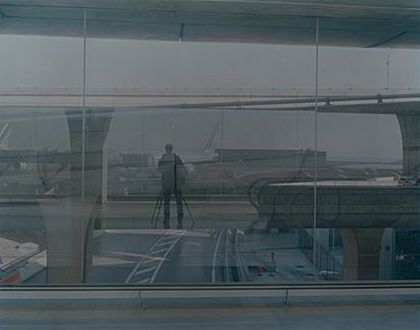
JH Engström _______________________
The Beautiful Game: History as Humanism
Alexander Lee
History has no use: without truth, it is useless. It can leave us no richer, no poorer, no happier, no more content: it cannot build higher skyscrapers, salvage economic collapse or affect medical advances. It contributes nothing to our survival as individuals, or as a species. Yet, precisely because it has no function, it is a valuable affirmation of our humanity. In practicing history, we continually restate our basic human identity, proclaim our uniqueness, and declare our status as human beings. In that it plays always with uncertainty, history remains always a game without function, but in that such a lack of function confirms our humanity, it is indeed a beautiful game....(more)
The Utopian_______________________
Inde tibi tuaeque rei publicae quod imitere capias...
Dean Rowan responds to In Tough Times, the Humanities Must Justify Their Worth
Accidental Blogger
How are "producing enough trained engineers and scientists" and the study of the humanities mutually exclusive enterprises in the struggle to assure "America’s economic vitality"? Why only our "economic" vitality? I'm with Derek Bok: "There’s a lot more to a liberal education than improving the economy." One might even demand engineers and scientists to justify their worth in humanistic terms.
I cribbed this post's title from an old book review in Slate that discusses the growing popularity of the study of Latin. This is one of those instances of remarkable, perhaps not merely fortuitous timing, when the report of the imminent collapse of the humanities, a "prerequisite for personal growth and participation in a free democracy," is proclaimed pretty much just as the study of its emblematic, dead language becomes fodder for best sellers....(more)
_______________________
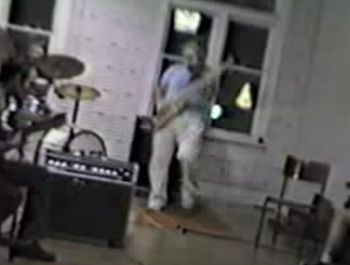
The Nihilist Spasm Band in 1982 I shot this when I was 13 in London Ontario at THE FOREST CITY ART GALLERY when it was located above NOVACKS on King street.
The band here are Greg Curnoe, Hugh McIntyre, Murray Favro and guest John Moss.
- MarkFavro
more spasm on youtube
Time For Those Ears To Bleed Real Good...
loveecstasycrime posts links to many nihilist spasm band recordings _______________________
Roberto Piva: Eight Manifesti
translated by Chris Daniels
The Xxi Century Will Give Me Reason
(if everything doesn’t blow up beforehand)
The XXI Century will give me reason to abandon, in language & in action, Christian, Eastern & Western civilization with their technology of extermination & scrap iron, their computers that control, their morals, their drivelling poets, their cancer-that-no-one-can-find-the-cause-of, their fucking nuclear rockets, their demographic explosion, their poisoned vegetables, their legislative crime syndicates, their gangster ministers, their minister gangsters, their left-fascist parties, their training-ship women, their various uniforms, their electronic cassettes, their Spanish flu, their unified order, their suicide epidemic, their sedentary literati, their cultural watchdogs, their pro-Cuba, anti-Cuba, their CP door-mats, their right-wing bidets, the stale water on their brains, their sempiternal shrewdness, their cups of tea, their manuals of aesthetics, their global village, all their sapient talking heads, their jails, their little smoked-glass gardens, their paralytic televised dreams, their coquettes, their rivers full of sardine tins, their prayers, their pancakes crammed in with disgust, their last hopes, their tripes, their August moonlight, their bores, their embalmed cities, their sadness, their cheerful cretins, their leprosy, their cage, their strychnine, their tides of mud, their fountains of despair. ...(more)
_______________________
Coffee and candour with Cohen
Simon Houpt
Globe and Mail
"The clear sense that you know you're in the homeward stretch is a very compelling component in writing," he says. "A lot of other things fall away that you hope would satisfy you like human life, and your work becomes a kind of haven, and you want to go there, and you're grateful when the time opens in such a way that you can actually sit down and work at your own work, because everything else somehow has failed.
"I'm speaking not just for myself," he continues. "Somehow, just in the nature of things, you know, the disappointments accumulate, and the obstacles multiply and you sense the destruction of your body, and your mind, and you feel here is the last arena — 'arena' is too big, the last boxing ring, or the last Ouija board, where you can examine some of the ideas that have intrigued you. That have seized you, really."...(more)
_______________________
Leonard Cohen, Live From The Beacon Theatre
NPR
via pas au-delà
_______________________
War is a church.
Memory is a church on fire.
War and the idea of war
Will eat the tomorrow out of our bones.
(culled from "The Sin Eaters" by Sherman Alexie)
Kathang-Pinay
_______________________
 skater at Beveridge Locks
photo - mw
_______________________
John Cleese’s Cleeseblog
|

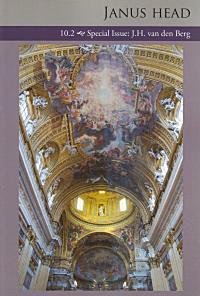 Janus Head
Janus Head
 The Age of Briggs & Stratton
The Age of Briggs & Stratton
















































